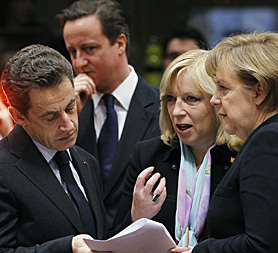Cameron wins agreement on EU budget freeze
David Cameron says he has won the backing of France and Germany for a freeze in the European Union budget from 2013 to 2020.
Speaking at an EU summit in Brussels, the Prime Minister said other countries would also sign the text on the budget freeze, but he did not name them.
The wording will be published tomorrow and, if approved by other EU countries, will mean the EU’s spending rises only in line with inflation from 2013-20.
“Galvanised other European leaders” Prime Minister David Cameron
Mr Cameron said the fact that the EU’s three biggest countries were “standing together, united” was a “huge achievement”, adding: “You have got a new British Government that has taken the initiative on spending, has galvanised other European leaders and is having an impact. You are seeing a different approach that is yielding results.”

Budget rising next year
The budget is due to rise by 2.9 per cent next year, despite Mr Cameron’s call for a freeze at a previous summit.
This figure was a compromise agreed after the European Parliament demanded a 6 per cent rise. The Prime Minister said he had not been able to achieve a freeze next year because Britain had been outvoted.
“Desperately trying to appear tough” Shadow Foreign Secretary Yvette Cooper
The Shadow Foreign Secretary, Yvette Cooper, accused Mr Cameron of “desperately trying to appear tough in front of his eurosceptic backbenchers at home”, while “agreeing to give more money to the EU”.
She added: “The EU budget is still going up by 2.9 per cent this year, and there is no serious plan to get the budget down in future years.
“There is no agreement to even discuss serious reforms on things like the Common Agricultural Policy that could cut the budget.”
No backroom deals
Mr Cameron denied he had agreed a deal with President Nicolas Sarkozy to protect France’s payments from the Common Agricultural Policy. He said there had been “no backroom deals or secret agreements”.
He added: “What I am doing, together with our key partners in Europe, is putting down a firm marker for these negotiations. All around Europe, countries are tightening their belts to deal with their deficits. Europe can’t be immune from that.”
The summit has also been discussing the new permanent mechanism that will be used to bail out euro members whose economies are in trouble. Mr Cameron said Britain would not be a part of the mechanism, which will be introduced in 2013.
Nor would a separate treaty clause, Article 122, be used again to raise money to support eurozone countries, like Greece and Ireland, in economic turmoil. Britain argues that this article should only apply to natural disasters, as originally intended.
-
Latest news
-
Ukraine Russia: is the West ready to go to war? – The Political Fourcast36m

-
Laughing Boy: New play tells the tragic tale of Connor Sparrowhawk5m

-
Sewage warning system allows some of worst test results to be left off rating system, analysis shows3m

-
Post Office inquiry: Former CEO didn’t like word “bugs” to refer to faulty IT system4m

-
Israeli soldier speaks out on war in Gaza12m

-




